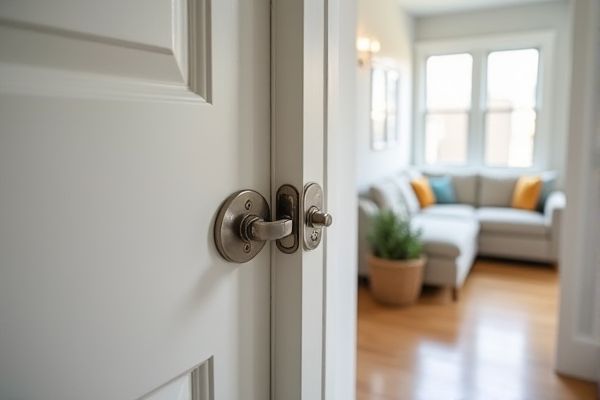
Mudroom self-closing hinges ensure doors automatically shut to prevent dirt and debris from entering, providing a practical solution for high-traffic areas; soft-close hinges, on the other hand, offer a gentle, quiet closure that minimizes noise and extends door lifespan. Discover which hinge type best suits Your mudroom needs by exploring the detailed comparison in the rest of this article.
Table of Comparison
| Feature | Mudroom Self-Closing Hinges | Soft-Close Hinges |
|---|---|---|
| Function | Automatically closes door after opening | Controls door closing speed to prevent slamming |
| Installation | Requires specific mudroom hinge type, often spring-loaded | Compatible with most cabinet doors, requires damper mechanism |
| Durability | Durable under frequent door use and mudroom conditions | Durable, designed to reduce wear from slamming |
| Best Use | Mudrooms, utility rooms, high-traffic doorways | Kitchen cabinets, bathroom cabinets, modern cabinetry |
| Noise Level | May produce audible clicking when closing | Quiet, cushioned closing action |
| Price | Generally lower cost | Typically higher cost due to advanced mechanism |
Introduction to Mudroom Door Hinges
Mudroom door hinges play a crucial role in enhancing functionality and durability in high-traffic entry areas. Self-closing hinges automatically return doors to a closed position, preventing dirt and moisture from spreading, while soft-close hinges ensure a quieter, smoother closing experience without slamming. Choosing the right hinge type optimizes your mudroom's efficiency and extends the longevity of your doors.
What Are Self-Closing Hinges?
Self-closing hinges are designed with a built-in spring mechanism that automatically closes the mudroom door after it has been opened, ensuring it remains securely shut without manual effort. These hinges enhance energy efficiency by reducing drafts and maintain cleanliness by preventing dirt and debris from entering your home. Choosing self-closing hinges for your mudroom optimizes convenience and functionality while protecting your space from outdoor elements.
What Are Soft-Close Hinges?
Soft-close hinges are specialized hardware designed to slowly and quietly close mudroom cabinet doors, preventing slamming and reducing wear over time. These hinges incorporate a hydraulic or damping mechanism that controls door movement, enhancing durability and maintaining a peaceful environment. Unlike standard self-closing hinges, soft-close options prioritize smooth, gentle closure tailored for high-traffic areas like mudrooms.
Key Differences: Self-Closing vs Soft-Close Hinges
Mudroom self-closing hinges automatically pull doors shut when released, ensuring doors close securely without slamming, ideal for high-traffic areas. Soft-close hinges incorporate dampers to slow door movement in the final phase, preventing noise and damage from abrupt closing. While self-closing hinges emphasize convenience and consistent door closure, soft-close hinges prioritize quiet operation and gentle handling, crucial for maintaining door integrity and household tranquility.
Benefits of Self-Closing Hinges in Mudrooms
Self-closing hinges in mudrooms enhance convenience by ensuring doors automatically shut, helping to maintain cleanliness and organization in high-traffic areas. These hinges reduce energy loss by keeping doors securely closed, improving home insulation and reducing utility costs. Their durability and low maintenance benefits make them ideal for mudrooms, where frequent door usage demands reliable hardware.
Advantages of Soft-Close Hinges in Mudrooms
Soft-close hinges in mudrooms prevent slamming by gently closing doors, protecting both the door and frame from damage. These hinges enhance safety by reducing finger injuries, a vital feature in busy household areas. Your mudroom benefits from quieter operation and increased durability, making soft-close hinges a practical and user-friendly choice.
Installation Considerations for Both Hinge Types
Mudroom self-closing hinges typically require precise alignment during installation to ensure doors close automatically with sufficient force, often needing pre-drilled holes and adjustment for spring tension. Soft-close hinges demand more careful installation to align the damping mechanism properly, which may involve additional screws or plates to secure the slow-closing feature and prevent door slamming. Both hinge types benefit from using a drill guide and level to improve accuracy, but soft-close hinges generally require slightly more intricate adjustments to achieve optimal performance.
Maintenance Tips for Mudroom Hinges
Mudroom self-closing hinges require regular lubrication and occasional tightening to maintain smooth operation and prevent squeaking. Soft-close hinges benefit from cleaning debris buildup around the damping mechanism to ensure gentle, noise-free closing over time. You can extend the lifespan of both hinge types by inspecting them periodically for wear and promptly addressing any misalignment or hardware loosening.
Cost Comparison: Self-Closing vs Soft-Close Hinges
Self-closing hinges for mudrooms typically cost less, ranging from $10 to $25 per pair, making them a budget-friendly option for reliable door operation. Soft-close hinges, priced between $30 and $60 per pair, offer advanced damping features to prevent slamming but come at a higher initial investment. The added expense of soft-close hinges may be justified by enhanced door longevity and quieter performance in high-traffic mudroom areas.
Which Hinge Type Is Best for Your Mudroom?
Self-closing hinges ensure your mudroom door automatically shuts, preventing dirt and debris from entering while improving energy efficiency by maintaining a sealed environment. Soft-close hinges provide a gentle, noise-free closing motion that enhances durability and user comfort, reducing wear on the door and frame. Choosing between self-closing or soft-close hinges depends on prioritizing functionality for cleanliness and energy savings versus minimizing noise and extending hardware lifespan.
 homyna.com
homyna.com